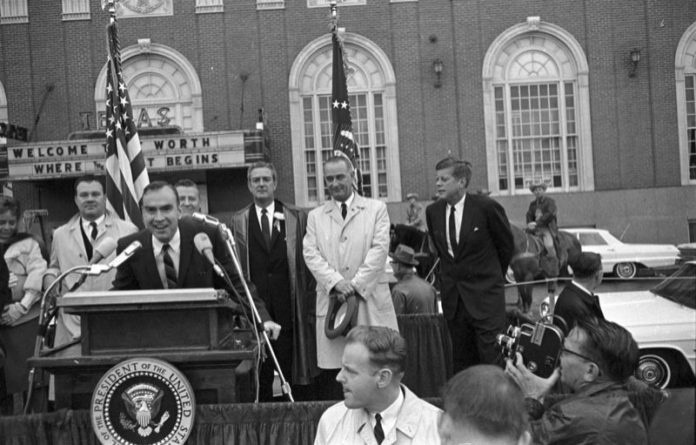He was quite an orator. Conversation was one of his more powerful political tools.
Jim Wright, who died last week, may have been the last great orator to walk the halls of Congress, noted Texas Christian University political science professor Jim Riddlesperger. He pointed to Wright’s speech during one of his most tense and challenging political trials in 1989, speaking to his beloved institution, the House of Representatives, attempting to defuse a political firestorm centered around a book deal.
His voice broke at times and tears appeared during his speech.
“It is grievously hurtful to our society when vilification becomes an accepted form of political debate, when negative campaigning becomes a full-time occupation, when members of each party become self-appointed vigilantes carrying out personal vendettas against members of the other party,” Wright lamented. “In God’s name, that’s not what this institution is supposed to be about.”
In the end, Wright offered to resign to spare the House what he called “distractions” and asked that both sides resolve to “bring this period of mindless cannibalism to an end.”
“I always urge people to go back and read that speech. It was one of his finest moments,” said Riddlesperger, noting that the charges against Wright were small potatoes compared to many that would follow.
In 1987, in pre-Glasnost times, then-Speaker Jim Wright spoke on Soviet TV for more than 10 minutes.
“[T]here is a sense in which we are fellow citizens. To express this fact in the most dangerous way, my home town in Texas is only 40 minutes away by Soviet intercontinental missiles from Vladivostok. And so, in that sense, you and I do live in the same neighborhood.“
Wright got 3,000 letters from the Soviet Union following that speech, Riddlesperger said.
But it wasn’t just the big stages where Wright excelled.
“When you met him, he always began with ‘how are you?’ That was his style and also reflected who he was. He didn’t want a ‘just fine’ for an answer. He wanted to hear about you and yourself. That’s a key to not only understanding him, but his political success.”
Riddlesperger also said that Wright’s memory of names was “just astonishing.”
“[At TCU] he would speak to a group of teachers – as he did every summer for years and years – and one of the teachers came up and asked if Mr. Wright would mind if she came up and talked to him. She said that Mr. Wright had gone hunting with her father at his father’s cabin many years ago, probably in the ’40 or early ’50s.
“Well, Mr. Wright not just remembered the name of her father, but also her fathers’ two hunting dogs. That ability to connect with other people was legendary and a key to what made him successful.”
Wright’s early career was shaken by the events of Nov. 22, 1963. As a prominent Texas Democrat, Wright joined officials in welcoming President John F. Kennedy to Fort Worth shortly before the group headed to Dallas. Wright, along with other Texas politicians, such as Gov. John Connally, was going to accompany the president on his trip around the state.
Wright attended the president’s speech to the crowd outside the Hotel Texas in downtown Fort Worth and was with the president during his speech at the Fort Worth Chamber of Commerce breakfast.
Wright recalled that day during a 2013 Fort Worth Chamber of Commerce event commemorating President Kennedy’s speech to the chamber and to the crowd shortly before leaving for Dallas.
“There was optimism and hope,” at the time, Wright said.
After the president spoke to the chamber in 1963, Wright, Connally and his wife and others joined Kennedy and the first lady aboard Air Force One for the short flight from Carswell Air Force Base to Love Field in Dallas.
“While on board, the president asked Gov. Connally and myself to come and sit with him in his private quarters,” Wright recalled. “He asked us to explain what led to the development of Fort Worth and Dallas, and why the two cities were as different as they were.
“We were doing our best to tell him what we knew and what we could put together on that subject. When the plane landed, the president looked at us and said, ‘We must continue this conversation this afternoon on the way to Austin.'”
“It is my fervent hope,” Wright said at the 2013 event remembering the events of 50 years earlier, “that we will be able to continue that conversation soon.”
Have a great conversation, Mr. Speaker.






